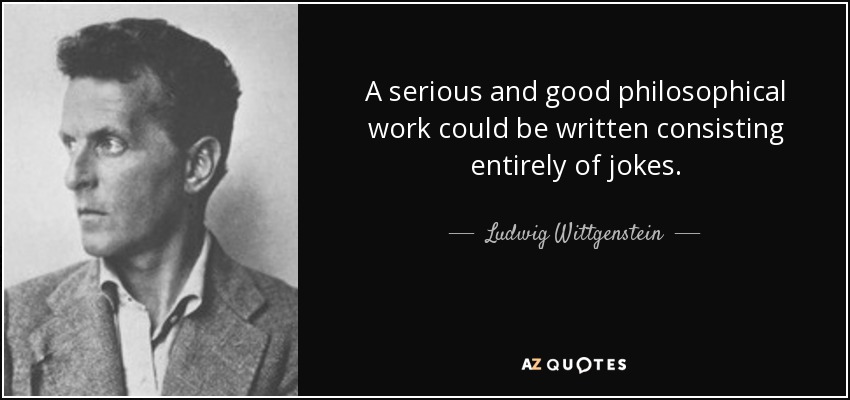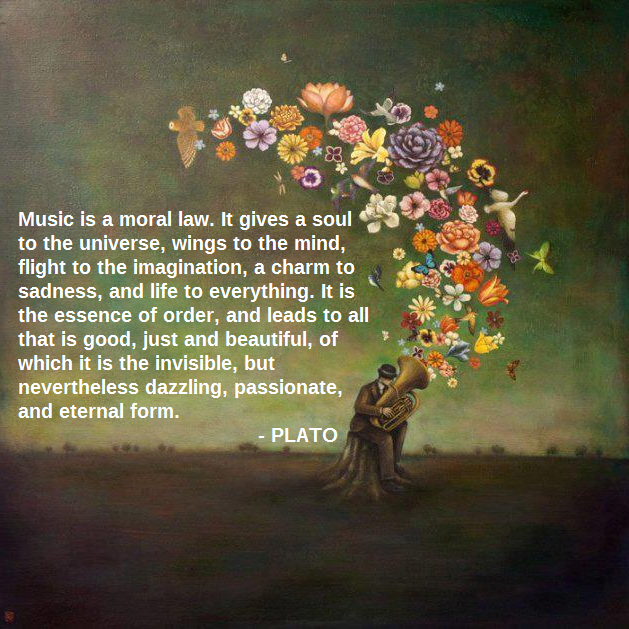Wittgenstein's Most Beloved Quote Was Real, But It's Fake Now
Seong-Young Her
“A serious and good philosophical work could be written consisting entirely of jokes.” This is possibly Wittgenstein’s most popular line, alongside “the limits of my language mean the limits of my world” and “whereof one cannot speak, thereof one must be silent”; the kind of line that gets printed on mugs on Etsy.
A philosopher friend of mine pointed out that the above quote sounds like it was either:
(a) intended by Wittgenstein as a hypothetical position he’s setting up to attack; or (b) not really Wittgenstein at all.
I also had a hunch that it was a fake quote, but I had always taken for granted that Wittgenstein did say that somewhere. I tried to find out where it appears in his works. I discovered that the quote doesn’t appear in any of his published works at all, although he probably did make such a remark.
The quote is variously cited in both peer-reviewed books and articles as well as on web forums and quote aggregator websites, as being from Philosophical Investigations, a legend, or some unnamed posthumous work. It originates from Norman Malcolm’s memoir of Wittgenstein, published in 1958 (7 years after Wittgenstein’s death):
A curious thing, which I observed innumerable times, was that when Wittgenstein invented an example during his lectures in order to illustrate a point, he himself would grin at the absurdity of what he had imagined. But if any member of the class were to chuckle, his expression would change to severity and he would exclaim in reproof, “No, no; I’m serious!” The imaginary events and circumstances were so odd and so far beyond the reach of natural possibility that he himself could not help being amused; yet the intention of the example, of course, was serious. Wittgenstein could not tolerate a facetious tone in his classes, the tone that is characteristic of philosophical discussion among clever people who have no serious purpose.
It is worth noting that Wittgenstein once said that a serious and good philosophical work could be written that would consist entirely of jokes (without begin [sic] facetious). Another time he said that a philosophical treatise might contain nothing but questions (without answers). In his own writing he made wide use of both.
Norman Malcolm, Ludwig Wittgenstein: A Memoir (1958 [bold emphasis my own.])
The most popular phrasing, from Henry Dribble, is a (very slight) paraphrasing of Norman Malcolm’s. It first appeared in 2004, in “A View from the Asylum”, one of several satirical short stories written from the perspective of “Henry Dribble”, a patient in an insane asylum. It was published in a collection of similar writings under the same pseudonym of Henry Dribble, titled Philosophical Investigations from The Sanctity of the Press. The author, Jess Rosenblatt, was an “armchair philosopher” from Mercer Island, working as a manufacturing sales manager at CMF Industries at the time. In an interview about the book, Rosenblatt said that “academics won’t promote [Wittgenstein] or teach his theories because they see him as destructive of all previous philosophy. You’ll find more hackers who like him, I’m a philosophical hacker because I’m not in academics anymore.”
As of right now, a Google search of the exact phrasing from Malcolm’s 1958 memoir brings up a mere 78 results; the exact phrasing from Rosenblatt’s book brings up over 7730 results. It’s the top result for “Wittgenstein quote”. So, most people are quoting the fictional character Henry Dribble, who is paraphrasing Norman Malcolm, who is paraphrasing Wittgenstein, who may have been joking (but was not being facetious). It would seem that Rosenblatt did indeed contribute somewhat to popularising Wittgenstein with his catchier phrasing.
The last time I wrote about misattributed philosophy quotes, I mused regarding a fake Plato quote that “It’s as if there exists a Plato quite different from one whom we know from his books, a folk hero who loved music and wrote in flowery prose that our world is made up of something beautiful, and that hope exists as an intrinsic component of reality.”

So, did Rosenblatt create a different Wittgenstein? After all, the quote is hardly incorrect in the sense of being a fabrication. Rosenblatt’s books are by no means influential beyond this very specific contribution of an alternative phrasing of Malcolm’s line (the book was published as a Print On Demand e-book on Amazon, and has a total of two reviews as of now). Wittgenstein did indeed say such a thing at some point, and the line is indeed attributed to Wittgenstein the Philosopher. Therefore, it seems commonsensically true that there is a one-to-one referential relation between the quotation and Wittgenstein’s initial utterance.
Yet, something is amiss. Not only does the fictionally-presented Dribble-Wittgenstein phrasing vastly outnumber the Malcolm-Wittgenstein phrasing generally (over 7730 to 78 results on Google), it also outnumbers it slightly in academic writing too (49 to 41 in a Google Scholar search as of now).
| Google search results | Google Scholar search results | |
|---|---|---|
| Dribble-Wittgenstein Phrasing | 7,730 | 49 |
| Malcolm-Wittgenstein Phrasing | 78 | 41 |
This pattern of usage strongly suggests that the two quotes represent two concepts of Wittgenstein. Not because they have two distinct references, but because they each have a distinct sense.
The famous example given by Frege to illustrate this type of situation is about one planet with several names: the word “Morning Star” and “Evening Star” both refer to the same planet (Venus), but have two distinct senses (the time of day). In contrast, the folk-heroic Plato from the earlier example is a different individual from the historically accurate Plato, and therefore the word “Plato” in each context does not refer to the same individual (it’s plausible to say that they share neither sense nor reference).
So, in which sense is Wittgenstein is being quoted when the Dribble-Wittgenstein phrasing is used instead of the Malcolm-Wittgenstein phrasing? Is it still the same Wittgenstein? Presumably, there is no doubt as to which Wittgenstein Malcolm quotes in his memoir, though he is recalling an event from 1939 in a book published in 1958, and so the actual phrase uttered by Wittgenstein likely differed from both of the later phrasings.
Consider that Person 1 knows that A -> B, Person 2 knows that A -> B and B -> C, and Person 3 knows that A -> C. Can Person 3 be said to also know that B -> C purely from this chain of knowing? Certainly not.
Consider that Malcolm knows that A (Wittgenstein’s original phrasing) = B (Malcolm-Wittgenstein phrasing), and Dribble knows that B (Malcolm-Wittgenstein phrasing) = C (Dribble-Wittgenstein phrasing). Can those using the Dribble-Wittgenstein phrasing be said to know that C (Dribble-Wittgenstein phrasing) = A (Wittgenstein’s original phrasing)?
Traditional theories of meaning and reference would tell us that, indeed, given the near-identity of the two phrasings and their attribution to “Ludwig Wittgenstein” the great philosopher, there can be little doubt that the sense of “Ludwig Wittgenstein” attached to each phrasing is also identical. The fact that several peer-reviewed books and articles make use of the Dribble-Wittgenstein phrasing seems, prima facie, supportive of this position. It suggests that there’s nothing wrong with using the Dribble-Wittgenstein phrasing, because the phrase is universally accepted as a trustworthy enough piece of apocryphal story (because it is a well known and popular piece of apocryphal story) attributed to Wittgenstein the Philosopher of Language.
The early Wittgenstein probably would have supported the notion too. Insofar as the word “Wittgenstein” in both versions refers to the same object (himself), it has the same meaning in both cases. The later Wittgenstein might have disagreed: Wittgenstein the Philosopher of Language was a serious-minded thinker attempting to make sense of logic, meaning, and mathematics; Wittgenstein the Mad Dog is a mystical character who wants to wake us up with fortune cookie wisdom that feels simultaneously anti-establishment (philosophy and stuffy academia are a joke) and empowering (having a good sense of humour is much the same as being a good philosopher). The context and use of the quote and the word are not the same, and therefore the meaning of “Wittgenstein” as well as the quote itself differs depending on whether it is used to make a point about (say) philosophical logic.
Contemporary trends in Wittgenstein scholarship seem to be blurring the line between these two Wittgensteins in their own way, interpreting him as having been more sympathetic to metaphysics than was previously thought. That’s just as well. For most of us, the line between historical individuals and their folkloric counterparts is always blurred. This is necessarily the case with historical figures from another time, and frequently so even with those whom we are close. It can even happen with our memory of past events, or with our self-identity. The quintessential difference between the early and later Wittgenstein is his shift from viewing meaning as representation to viewing meaning as use. How we live changes over time, and so does the meaning of our lives. The Wittgenstein I knew before discovering the genealogy of his most popular quote was not the same Wittgenstein as I know now; I can no longer use the quote to refer to the Wittgenstein that I knew before.